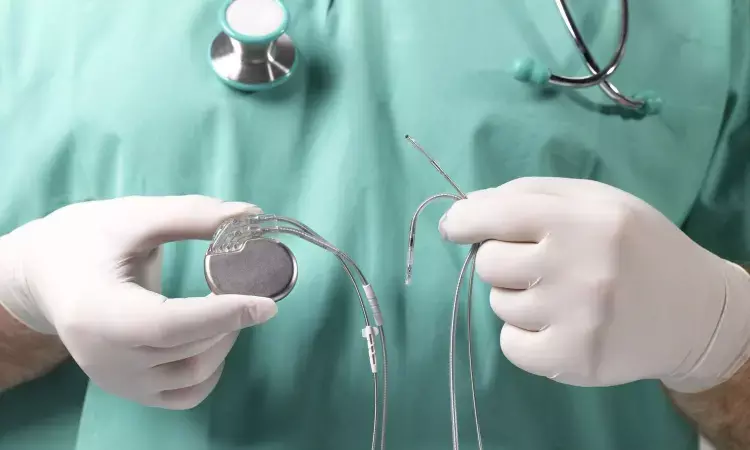- Home
- Medical news & Guidelines
- Anesthesiology
- Cardiology and CTVS
- Critical Care
- Dentistry
- Dermatology
- Diabetes and Endocrinology
- ENT
- Gastroenterology
- Medicine
- Nephrology
- Neurology
- Obstretics-Gynaecology
- Oncology
- Ophthalmology
- Orthopaedics
- Pediatrics-Neonatology
- Psychiatry
- Pulmonology
- Radiology
- Surgery
- Urology
- Laboratory Medicine
- Diet
- Nursing
- Paramedical
- Physiotherapy
- Health news
- Fact Check
- Bone Health Fact Check
- Brain Health Fact Check
- Cancer Related Fact Check
- Child Care Fact Check
- Dental and oral health fact check
- Diabetes and metabolic health fact check
- Diet and Nutrition Fact Check
- Eye and ENT Care Fact Check
- Fitness fact check
- Gut health fact check
- Heart health fact check
- Kidney health fact check
- Medical education fact check
- Men's health fact check
- Respiratory fact check
- Skin and hair care fact check
- Vaccine and Immunization fact check
- Women's health fact check
- AYUSH
- State News
- Andaman and Nicobar Islands
- Andhra Pradesh
- Arunachal Pradesh
- Assam
- Bihar
- Chandigarh
- Chattisgarh
- Dadra and Nagar Haveli
- Daman and Diu
- Delhi
- Goa
- Gujarat
- Haryana
- Himachal Pradesh
- Jammu & Kashmir
- Jharkhand
- Karnataka
- Kerala
- Ladakh
- Lakshadweep
- Madhya Pradesh
- Maharashtra
- Manipur
- Meghalaya
- Mizoram
- Nagaland
- Odisha
- Puducherry
- Punjab
- Rajasthan
- Sikkim
- Tamil Nadu
- Telangana
- Tripura
- Uttar Pradesh
- Uttrakhand
- West Bengal
- Medical Education
- Industry
Personalized accelerated pacing safe and improves QoL in HFpEF patients with pacemaker

USA: Treatment with a moderately accelerated, personalized pacing rate was found to be safe and improved quality of life among HFpEF (heart failure with preserved ejection fraction) patients with pacemakers, results from myPACE Randomized Clinical Trial have shown.
Personalized accelerated pacing also improved physical activity, atrial fibrillation, and NT-proBNP (N-terminal pro–brain natriuretic peptide) levels compared with the usual 60 bpm (beats per minute) setting. The findings from the blinded randomized clinical trial appeared in the journal JAMA Cardiology on February 1, 2023.
HFpEF patients with a pacemaker may benefit from a higher, more physiologic backup heart rate than the nominal 60 bpm setting. Considering this, Margaret Infeld from the University of Vermont Larner College of Medicine, Burlington, and colleagues assessed the effects of a moderately accelerated personalized backup heart rate versus 60 bpm (usual care) in patients with preexisting pacemaker systems that limit pacemaker-mediated dyssynchrony.
They addressed whether moderately accelerated, personalized backup heart rates are superior to the nominal setting of 60 beats per minute in this study population.
The RCT enrolled patients with stage B and C HFpEF from a pacemaker clinic between 2019 and 2020. Participants were randomly assigned to personalized accelerated pacing or usual care, and follow-up was of 1 year. A resting heart rate algorithm based on height and modified by ejection fraction was used to calculate the personalized accelerated pacing heart rate.
The serial change in MLHFQ (Minnesota Living with Heart Failure Questionnaire) score was determined (primary outcome). Secondary outcomes included changes in NT-proBNP levels, adverse clinical events, atrial fibrillation from baseline, and pacemaker-detected physical activity.
One hundred seven participants were randomly assigned, 50 to personalized accelerated pacing and 57 to usual care groups. The median age was 75 years, and 48% were female.
The study revealed the following findings:
- Over the 1-year follow-up, the median pacemaker-detected heart rate was 75 bpm in the personalized accelerated pacing arm and 65 bpm in usual care.
- MLHFQ scores improved in the personalized accelerated pacing group (median baseline MLHFQ score, 26; at one month, 15; at one year, 9) and worsened with usual care (median baseline MLHFQ score, 19; at one month, 23; at one year, 27).
- In addition, personalized accelerated pacing led to improved changes in NT-proBNP levels (mean decrease of 109 pg/dL vs an increase of 128 pg/dL with usual care), activity levels (mean [SD], +47 minutes per day vs −22 minutes per day with routine care), and device-detected atrial fibrillation (27% relative risk reduction compared with usual care) over 1-year of follow-up.
- Adverse clinical events occurred in 4 patients in the personalized accelerated pacing group and 11 in usual care.
"The study found that tailoring the pacemaker backup rate to approximate the resting heart rate of individual improved outcomes; heart rate modulation, delivered in a way that maintains or optimizes physiologic conduction, may be a therapeutic target among HFpEF," the researchers conclude.
Reference:
Infeld M, Wahlberg K, Cicero J, et al. Effect of Personalized Accelerated Pacing on Quality of Life, Physical Activity, and Atrial Fibrillation in Patients With Preclinical and Overt Heart Failure With Preserved Ejection Fraction: The myPACE Randomized Clinical Trial. JAMA Cardiol. Published online February 01, 2023. doi:10.1001/jamacardio.2022.5320
Dr Kamal Kant Kohli-MBBS, DTCD- a chest specialist with more than 30 years of practice and a flair for writing clinical articles, Dr Kamal Kant Kohli joined Medical Dialogues as a Chief Editor of Medical News. Besides writing articles, as an editor, he proofreads and verifies all the medical content published on Medical Dialogues including those coming from journals, studies,medical conferences,guidelines etc. Email: drkohli@medicaldialogues.in. Contact no. 011-43720751


